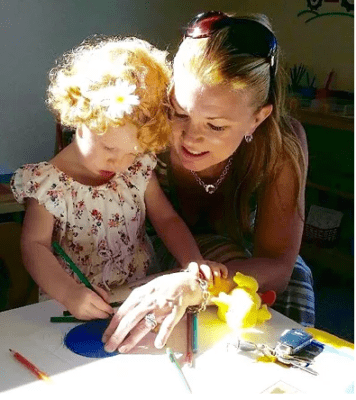
Benefits of a Montessori Classroom
Montessori’s research concluded that children learn best when they are allowed to discover and pursue subjects they are interested in. How do we balance self-paced development and education? Montessori can help!
Maria Montessori understood that child development is a natural, individual process. Every child is unique, and that includes the way in which he or she develops and learns. Different classrooms require a certain stage of development in order to succeed with the material. Elements of a classroom that are dictated by development include the timing of the work schedule, the materials that students interact with, and the manner in which children are taught. As a result, Montessori classrooms are divided based on Montessori principles of child development and not solely on academics.
This is a win-win for parents! Your child can excel in academic material beyond the walls of the classroom while at the same time remain in an environment that is developmentally appropriate. If a child has the capability, encouragement, and confidence to progress through material beyond the stereotypic expectations for his or her age, Montessori never holds him or her back! The child can physically remain in the same classroom while enjoying the benefits of higher level learning. Remember, patience and consistency are key. The classroom provides consistency, so the child feels confident to accept challenges and experiment with new and exciting topics. Patience is required to let this natural and exciting process run its course.

Montessori Teachers Understand
At Heritage Montessori, our trained teaching staff understand Montessori philosophy, including early child development. The role of the teacher as a guide allows for progression through material at the child’s pace and level of learning. A trusting, long-term relationship between teacher, parent and child is an important factor for success. A successful Montessori teacher utilizes the principle of self-directed learning; the teacher observes her student to know each facet of his or her personality and learning style. As a result, the teacher learns how to present advanced material in a manner that allows the child to succeed. For example, the teacher can manipulate concepts from an elementary classroom and design material that achieves the same goal but is expressed in a manner that a preschool student can understand. This concept also applies to emotional development. Again, win-win!

Parents: Pushing or Encouraging?
It can be difficult for parents to separate healthy encouragement and pressure. Where do we draw the line? Encouragement occurs when a parent introduces new challenges that lead to increased confidence after a success. The challenge has the opportunity to teach valuable life skills like hard work and introduces children to new topics to broaden their horizons. Pushing occurs when parents push beyond what a child is ready for, which can actually hurt their confidence and cause children to retreat inwards, running the risk for anxiety to develop later in life. Whether its encouragement or pushing, both come from the same place – love! Parents want the best for their children, to give them things they perceived they were lacking in their own childhood, and want to give them the best shot at life. Who wouldn’t want that? The key here is to let the child (and help from a Montessori expert) guide YOU. Knowing how much to push comes from understanding your child’s personality so you can better consider their strengths and weaknesses. Involve children in the conversation by letting them choose activities, just like choosing material in a Montessori classroom. Check your reasons for pushing at the door – take a step inside and examine your own motivations for pushing your child, especially during the preschool years. Are you encouraging your child to move to a “higher” classroom because it’s in his or her best interest, or does it fulfill a personal desire?

Final Thoughts
We all want our children to succeed, especially in school. Preschool is a wonderful time for a child to learn more about his or her environment, and more importantly, about his or her personal self. A Montessori classroom allows for multidimensional success in all developmental areas. Trust in the process and utilize opportunities for encouragement to connect with your child and strengthen your bond.


